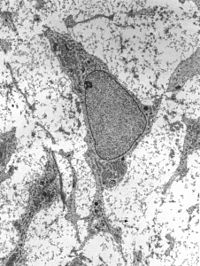
Photo from wikipedia
Lung cancer cells in the tumor microenvironment facilitate immune evasion that leads to failure of conventional chemotherapies, despite provisionally decided on the genetic diagnosis of patients in a clinical setup.… Click to show full abstract
Lung cancer cells in the tumor microenvironment facilitate immune evasion that leads to failure of conventional chemotherapies, despite provisionally decided on the genetic diagnosis of patients in a clinical setup. The current study follows three lung cancer patients who underwent “personalized” chemotherapeutic intervention. Patient-derived xenografts (PDXs) were subjected to tumor microarray and treatment screening with chemotherapies, either individually or in combination with the peptide R11-NLS-pep8; this peptide targets both membrane-associated and nuclear PCNA. Ex vivo, employing PDX-derived explants, it was found that combination with R11-NLS-pep8 stimulated antineoplastic effect of chemotherapies that were, although predicted based on the patient’s genetic mutation, inactive on their own. Furthermore, treatment in vivo of PDX-bearing mice showed an exactly similar trend in the result, corroborating the finding to be translated into clinical setup.
Journal Title: International Journal of Molecular Sciences
Year Published: 2022
Link to full text (if available)
Share on Social Media: Sign Up to like & get
recommendations!